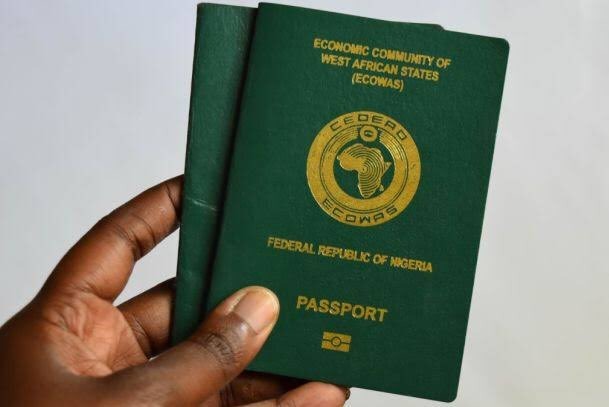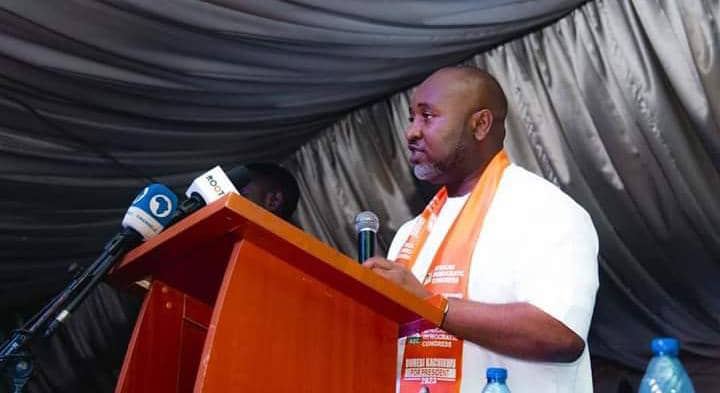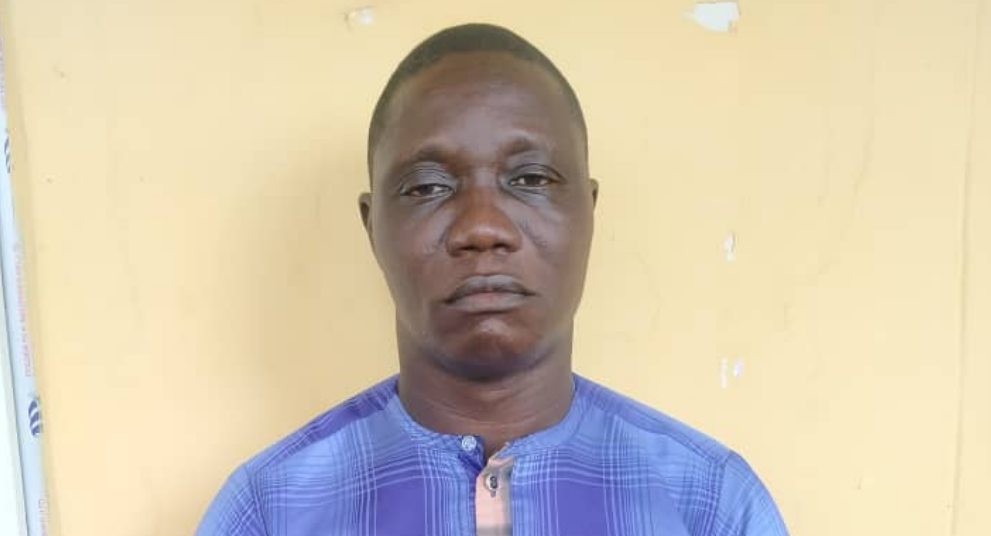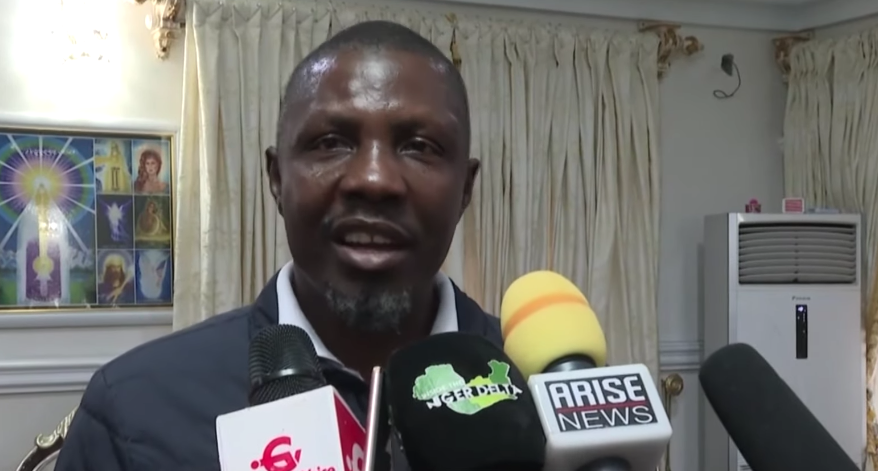The Nigeria Immigration Service launched an electronic passport application in 2019 to curb corruption and improve the application process for Nigerians, but the process has been sabotaged by corrupt officials of the service who continue to extort applicants for passports and frustrate those who fail to pay bribes. This investigation reveals how the electronic application process does not stop bribe-taking at Nigeria’s passport offices. The ICIR’s Nurudeen Akewushola reports.
In March, 28-year-old David Emmanuel, an indigene of Akwa Ibom state, secured a scholarship to study in Hungary but lost the scholarship because he could not renew his passport before the deadline.
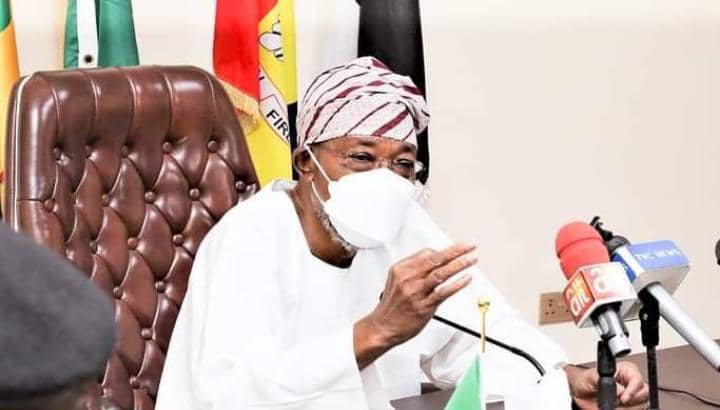
David applied in March and paid a sum of N26,000 through the website of the Nigeria Immigration Service and was asked to come for biometric enrollment in April. After the biometric, he was told to come back in three weeks.
He came back on the scheduled date, hoping that his passport had been processed but the response they gave him was that they couldn’t find his information on their portal. He was then told to come back after another two weeks.
Advertisement
“When I came back, they checked and checked, they said ‘status unknown’, they said I should check after another two weeks,” David said.
“I came back after two weeks, they still asked who was the officer in charge of my file. They said I should go and meet the officer in charge of my file and I said there’s no one in charge of my file. They said I should come back again in two weeks. I said what is happening? What is going on?
“I came back again after another two weeks. That’s like two months then. I now went to SERVICOM. They said let’s check the file. They searched and searched and they also asked who is the officer in charge of my file. I said why is it that they kept asking who is the officer in charge of my file. Why don’t you people state in the online requirement that applicants would be attached to an officer who is supposed to handle each person’s file? Why is it that it’s now when somebody now comes that they will be asking who is the officer in charge of your file? It’s kind of absurd.”
Advertisement
David didn’t know that the reason why they kept sending him back and forth was that he didn’t bribe NIS officials who would in turn help him to follow up with his file. But he later met an officer who explained to him how it works.
The officer advised him to reopen another file with N10,000. After then, the officer later told him that the officers producing the passport needed to be bribed with another N10,000 to get a booklet. That was how he ended up paying N20,000.
“Yet with the extra N20,000 that I paid, it took me 5 months to get the passport.”
The hurdles faced by David mirror the ordeals of several other Nigerian passport seekers extorted by Nigerian immigration officials.
Advertisement

The passport application process in Nigeria: The ideal vs reality
The Nigeria Immigration Service is responsible for the control of persons entering or leaving Nigeria; issuance of travel documents to bonafide Nigerians in and outside Nigeria; issuance of residence permits to foreigners in Nigeria; and border surveillance and patrol.
However, The ICIR findings show that the issuance of a passport by the NIS has been fraught with corruption despite the introduction of the electronic process.
In January 2019, the commission introduced an electronic passport application. The minister of Interior, Rauf Aregbesola said the electronic passport would solve the challenges of “shortage of booklet to touting and an economy of corruption built around it” which have persisted for so long.
Advertisement
The NIS stated on its website that the new e-passport comes in 3 categories, which are 32-pages 5-years validity, 64-pages 5-years validity and 64-pages 10-years validity.
Under the electronic process, the applicants are required to simply register and pay on the website. After successful payment, applicants are expected to book an appointment date, print an appointment slip, proceed for enrollment with all required documents on the appointment date and wait to be notified via text message for collection.
Advertisement
According to the agency, “an average Passport Processing time takes up to three weeks for renewals/reissue and six weeks for first-time applicants.”
Similarly, Immigration introduced the e-tracking system to phase out human interactions saying “the rowdiness and delay in the passport issuance would soon be a thing of the past.”
Advertisement
However, The ICIR investigations show that this is an empty promise. Currently, Nigerians spend longer time than the specified period, yet they are extorted by the officials of the Service including those at the headquarters, Abuja.
According to The NIS, the official price for a 64-page Nigerian passport with a 10-year validity period is N70,000, a 64-page passport with five years validity costs N35,000 and a 32-pages passport with a five-year validity period costs N25,000. The cost is even lower in some states such as Sokoto, Zamfara and Kebbi where a 32-page, five years validity passport goes for N15,000.
Advertisement
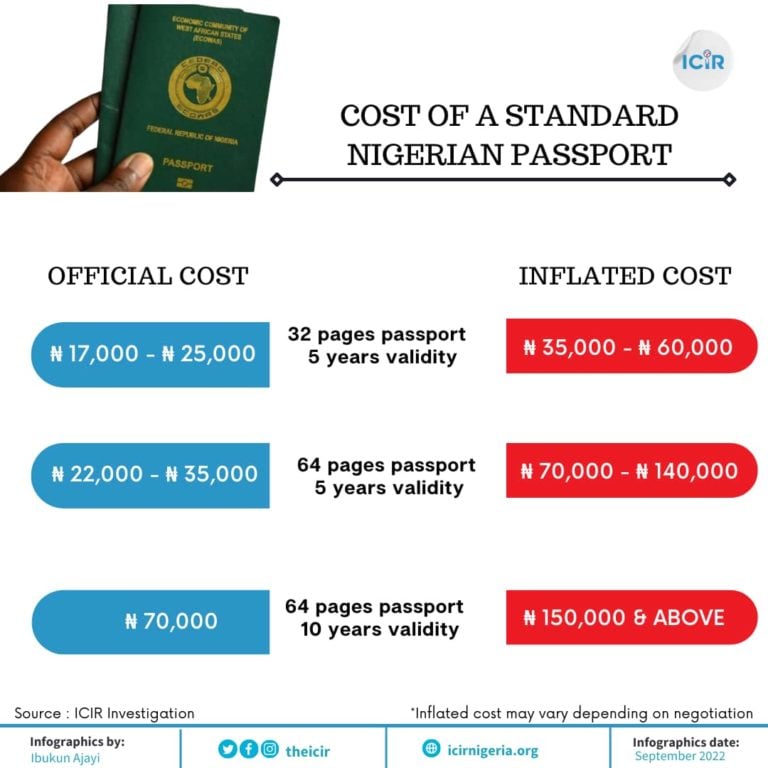
However, The ICIR findings show that some applicants pay between N40,000 and N60,000 for a 32-pages passport with five years of validity instead of N25,000. Some pay between N70,000-N140,000 for a 64-pages passport with a 5-year validity while some pay as much as N200,000 to obtain a 64-pages passport with 10 years of validity.
Cost of refusing to pay bribes
The ICIR findings show that despite the digitisation of the application process, some officials of the Nigerian Immigration Service still find ways to rip off applicants and delay the processing of the passport for those who refuse to comply.
Forty-two-year-old Amina Christina Kato was one of the victims. Amina had taken a one-week leave in her place of work to make herself available for her enrollment appointment after her possession had expired.
She expected that the process would not take longer than one week but she faced a hurdle when she encountered corrupt officials at NIS Headquarters in Abuja who insisted that she had to pay a bribe of N12,000 for her passport to be released.
“So I had gone to the NIS website to apply for a new passport because the old one in my possession has expired. Everything went smoothly, then I went for capture a month later. That was when the drama started. As soon as I entered the building, I was stopped by one officer. He asked me what I wanted to do and I said passport.
“Before he began I told him I applied online and came for capture. His countenance immediately changed. He then told me I will have to apply again on paper. I found that weird and told him that I already applied online. He insisted that I did another application on paper. He provided the paper and dictated to me what to write which I did.”
After she filled out the form, the officer asked her to pay N12,000 but she refused. He then threatened her that she would not be able to get her passport until she agreed.
“He then said that it’s either the 12k or I’ll sit all day waiting and nothing will happen. I told him I was on leave, that I had a week to run around so I will wait. He grudgingly handed me the file and went inside. I headed to a counter by my left and told them my mission.
“ By then it was around 10:45 am and my capture was for 11 am. I was directed to the counter on my left and that was where I met officer Lenin. He collected my file after I told him I applied online, he went through my papers and discovered that NIMC was yet to effect a correction on my name. He sent me to the NIN office beside the passport building to go and rectify it. I did and was asked to come back on Thursday but I was there on a Tuesday I think.
“On getting back from the NIN office, I looked for officer Lenin and thanked him. He asked me to go in for capture but my file could not be processed till the NIN is rectified. I asked him if I should come back on Thursday as they said. He said there was no need. I then asked him for his number so I can call and verify if the NIN went through. I did that and I left.”
Some weeks after, Amina called Lenin and it was a piece of good news— Her passport was out but Lenin said the officer(Ahmedu) that managed her file demanded N15,000 for her passport to be released.

When she contacted Ahmedu, the officer in charge of the passport, he asked her to send the money to Lenin. Amina asked if she was going to get a receipt for the payment, and the response she got was life-threatening.




“When I asked if I would be issued a receipt, he became angry and that was when he threatened me,” she said.
Amina had paid her N26,000 for the renewal of her passport on the NIS website; she had the receipt. Her only offence was that she refused to bribe the NIS officials, which led to the withholding of her passport.
Amina is one of the several Nigerian online applicants who suffered frustration at NIS offices over their refusal to pay bribes to NIS officials.
At the passport processing centres, those who pay directly to NIS officials or through agents always get a warm treatment while the ones who insist on due process suffer delay and frustration.
Enter the NIS headquarters where touting thrives
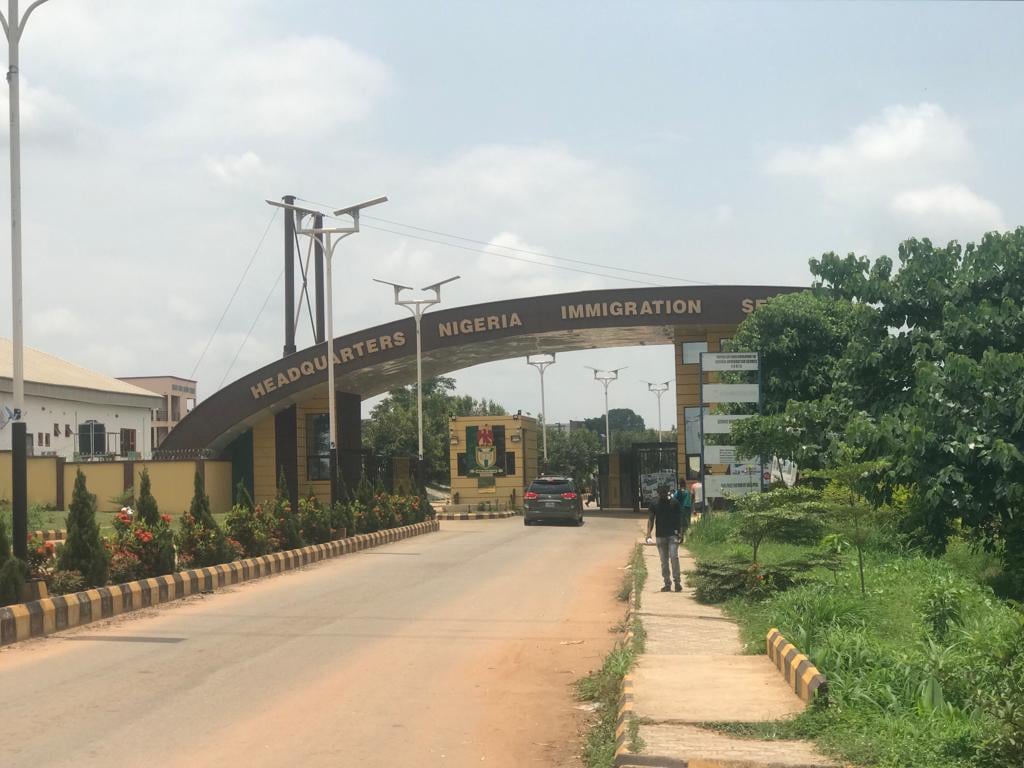
Being one of the most patronised passport processing centres in Nigeria, hundreds of passport seekers converge at the headquarters of Nigeria Immigration Service situated in Sauka, Abuja every weekday.
I visited the office on Friday, August 26, 2022. My mission is to verify the information I had received from the victims of extortion I have spoken with.
I arrived at the office at about 11 am and even though the rain just stopped that very morning, it did not affect the usual business of the day. The environment appeared orderly, calm, and busy.
There were about five officers situated at the entrance of the building who asked people about their purpose of visit before they were granted access to the premises. Inside the building, there were numerous officers of the Nigerian Army and combat-ready immigration officers almost everywhere–all dressed in NIS uniforms. There is practically nowhere within the four walls of the building without the presence of an immigration officer. However, despite this heavy security presence, extortion and bribe thrive inside the structure.
Visitors are usually categorised into two – those who come for passport-related issues and people who want to enter the bank or access other facilities in the building.
As I was about to enter, one of the officers whose tag read Babangida who seemed to be in his late 30s approached me and asked about my purpose of visit. After I told him that I was an intending passport applicant, he told me the official requirements but warned me that my passport might take a long time to be processed but there is a way I could “fastrack” it.
“One way is the one at the Gwalgwalada here. The least you are going to pay is N40,000 (for 32pages, 5 years validity passport). If I calculate, you will wait for one month and two weeks for capturing date. After that, they will write six weeks for you to come and collect but it may take like two to three months.”

He further advised that I should not do the processing in Abuja and if I wanted it quickly, I could pay him, he would send my details to the passport processing centre in Niger, we would go there together with his other clients and I could get it there within a day or two. He showed me the ones he had facilitated on his phone and the ones he is still working on as assurance.
“Look at yesterday’s own. They just sent it through the driver today. We went there yesterday and did the capturing and they sent it today, I will receive it this afternoon,” he said swiping through some passports he had facilitated on his phone.
In what seemed like a confession, when I told him that I applied online, he said:
“If you apply online, you will wait for your appointment date. It is the same thing. Even though when you apply online and you don’t have anybody that would run it for you, you will come here and stay long hours before they even look at you.
“Because you still have a lot of things to do. Once you apply, you never finished opening your file now. You will go court, you will look for guarantor…you will do this and that, all these it is an officer that would do it for you and you will pay him. That is how it is.”
He explained that a 32-pages passport with 5 years of validity cost N40,000 and 64-pages with 5 years of validity costs N110,000 to N120,000 and 64-pages with 10 years of validity could cost up to N200,000.
Even though the NIS said the electronic application was to phase out human involvement, The ICIR observed that the reality is different.
After the online application, the instruction by the NIS is that the applicants should go to the chosen office on their appointment date but this reporter observed that online applicants are usually directed to an officer who would open a file for them before they would be enrolled.
These officers usually charge the applicants between N9,000 to 15,000 as a “Fastrack” or administration fee and for the applicants who fail to pay the bribe, their passports get delayed for a long period.
When I proceeded to the checking point where visitors fill in their names and their purpose of visit, a middle-aged woman manning the point asked me what I wanted to do and when I told her that I was an online applicant, she asked if I had any officer that would “run” it for me.
When I told her that I did not have anybody, she shook her head pitifully signalling that I might face some hurdles ahead for not having any syndicate.
Inside the premises, I observed that immigration officers were almost at every corner– all garbed in their uniforms. However, it is hard to distinguish who is in charge of passport processing as almost all of them take “touting” as a side hustle.
When I reached the second checking point situated within the office’s premises before reaching the passport processing centre, I was stopped by an immigration officer namely Simon Bulus who asked what I intended to do.
“Na who you call ?” he retorted when told him of my intention to obtain a passport.
When I told him that I knew no one, he smiled and replied:
“If you pay now they will say you should come back in November. Come let me advise you. Here now, issue of fast no dey here. Before, when people came, they gave them two to three weeks but now they give them eight weeks. Before if you pay N150,000, you can get it but Oga don stop am,” he noted.
He advised me to go to Niger state or Nassarawa state if I wanted the passport quickly saying that if I went ahead and did it in Abuja it is at my peril. According to Bulus, this method which he described as “express” would cost me about N100, 000.
“Don’t allow anybody to deceive you and go and pay oooo. If you go pay now it will be November before they will ask you to come.”
“But this “express” na big money but you will do it, you will go and get it within a day or two.”
He further told me that if I wanted to go inside, I am free to do so and I could then come back to him if I wished to transact with him but after about 1hr when I came back to the checking point, Bulus had left his duty post(checking point) and went to the data processing centre to facilitate passport production for an applicant.
Bribery and touting are good business at Abuja NIS office
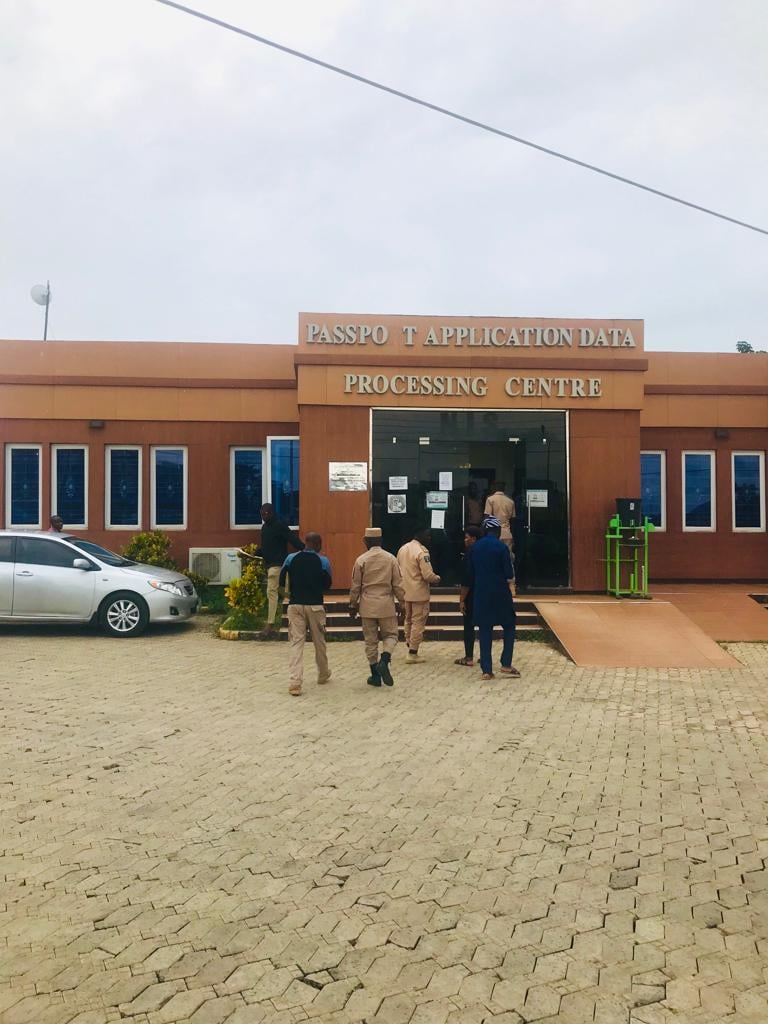
At the passport processing centre, the online applicants were referred to an officer called Dutse Idris Husseini who is in charge of processing the files of online applicants. However, Dutse charges applicants between N9,000-N15,000 as processing fees otherwise the file will not be processed and the applicants would spend a long time.

Now as a person trying to enquire about the passport collection process, I was referred to an officer called Amosu. Checks using Open Source Investigation tool shows that his full name is Johnny Amosu.
Felt comfortable about the fact that I could communicate in Yoruba, Amosu disclosed how the racket works.
After he listed all the official procedures, I asked him how much it would cost to obtain a passport.
“If it is 32-pages, five years that you want to do it, I won’t lie to you, the official payment of 32-pages is N27,000,” he replied in Yoruba.
“Then the processing fee is now between you and the officer that would help you to process it but it is N27,000 that is going to the pocket of the government. But as I am talking to you now, the booklet is scarce and the ones available, it is money that they are using to bring it out,” he said lowering his voice to ensure that he was not overheard by anyone.

Amosu explained that I could still follow the due process but it would take a long time. He explained that it costs N60,000 if I want it to be out within five working rather than the normal six weeks.
“There was a way that we used to do it before. That method is called “UBA” but it is not working anymore. Where we come in now is after the capturing. After the capturing, we will pick the file and within five working days, we will try and ensure that it is out but it will cost you 60k.”
“There are 32 pages 5 years, there are 64 pages 10 years. For 64 pages, 10 years, the official price that is going to the government’s pocket is 72k. For the 32pages, 5 years, the official payment going to the government’s pocket is N27,000. We have not talked about processing fees for the officials that would help you get approval, capturing and all because it has to go through the administrative processes.
“You know it is a government job, everybody knows how they find their ways. All of our bosses that you see, they also get their cut from what we earn here,” he said.

Following the lead from a victim, The ICIR also contacted Terver Emmanuel, one of the officers of the NIS.
When contacted via phone call, Terver asked this reporter to send him a direct message on WhatsApp.
After sending him a message, he hurriedly sent a form and asked this reporter to send his details adding that it costs N50,000 to obtain a 32-pages passport and N100,000 to acquire a 64-pages passport.
“Production is issued now. They are collecting above 20k only to produce so na understanding,” he said while justifying the reason for the inflated costs.

The ICIR also identified officer Bem Isaac Yisa who helps applicants to pass their files to the data-capturing officers inside the building – for a fee. An applicant said he transferred N2000 to his account on August 25 because Terver insisted that he did so before he could be invited for capturing.
More tales of frustration and ordeals
Many Nigerians have lamented missing scholarships, fellowships, and other opportunities due to the blatant corruption at Nigeria’s passport offices. One of them is Omoyemi Ogunlade.
In her own case, it was double jeopardy. She was charged N55,000 for online registration by an agent and was also extorted by corrupt immigration officers.
On the 26th of April, when she went to the NIS office in Lagos to do her biometric, she was charged another N15,000 to ‘fastrack’ her passport production, and out of desperation, she paid the money.
“I did my capturing on April 26th. I paid 15,000 for fast track and the officer said it should be out in 2-6 weeks. Up to date, the only thing they keep telling me is that there’s no booklet. And I paid for fast track. This is annoying!” said frustrated Omoyemi in July.
Omoyemi recalled that she had gotten several opportunities Abroad in the past but the lack of a passport was a setback for her. She cited this as a reason for her desperation.
“The purpose of an international passport is to travel. I have so many opportunities that I could not use because of this. I applied for a visa-sponsored job in the UK through my boyfriend in England, but I do not have my passport to continue the visa application process.”
Like Omoyemi, Abayomi Oluwaseun had been travelling back and forth from Osogbo to Abuja to process his passport since April. Despite paying N60,000 for the passport, he still struggles with the collection.
To Oluwaseun, acquiring a passport is a matter of urgency as he has already lost three international scholarships and cannot afford to lose more.
In the same vein, some Nigerians have, in the past, taken to social media to express their dissatisfaction over the irregularities happening at the various passport offices in the country.
On the 27th of August, a Twitter user, Muneer Yakub narrated how he was threatened by immigration officers at the Alausa office in Lagos for his refusal to pay bribes.
I went to a passport office in Lagos, asked some immigration officers what the process is. They said to give them 75k they’ll have it done for me. No. Turns out the official price is 25k so I asked for the DIY process. In 3wks i did capturing & got a text to come get my passport.
— Muneer Yaqub🇺🇸🇳🇬 (@elMunir5) August 7, 2022
Similarly, a Twitter user raised an alarm over how her husband was charged an extra fee at the NIS office in Yenogoa.
@nigimmigration Good morning, currently at Yenagoa office and after making payment online for renewal of passport. My husband is being asked to pay 10000naira before being captured.
— Binaebi Miebodei (@Bina2luv) August 5, 2022
A Twitter user, @Great_Val also recounted how the woman he recommended online processing for was harassed due to her refusal to pay bribes at the NIS headquarters.
due. Your immigration staff prefer to milk people N40,000 to N45,000 for a 32 page passport and N60,000 for a 64 page than to follow the due process. If you don't pay, they ensure you are frustrated. @segalink
— OLaz Val C (@Great_val) May 30, 2022
Bribery and Corruption: What the law says and the way out
According to a 2019 corruption report by the National Bureau of Statistics, an estimated NGN 675billion was paid as cash bribes by Nigerians to public officials in 2019. The report shows that some Nigerians pay as much as 6 per cent of their average annual income on paying bribes.
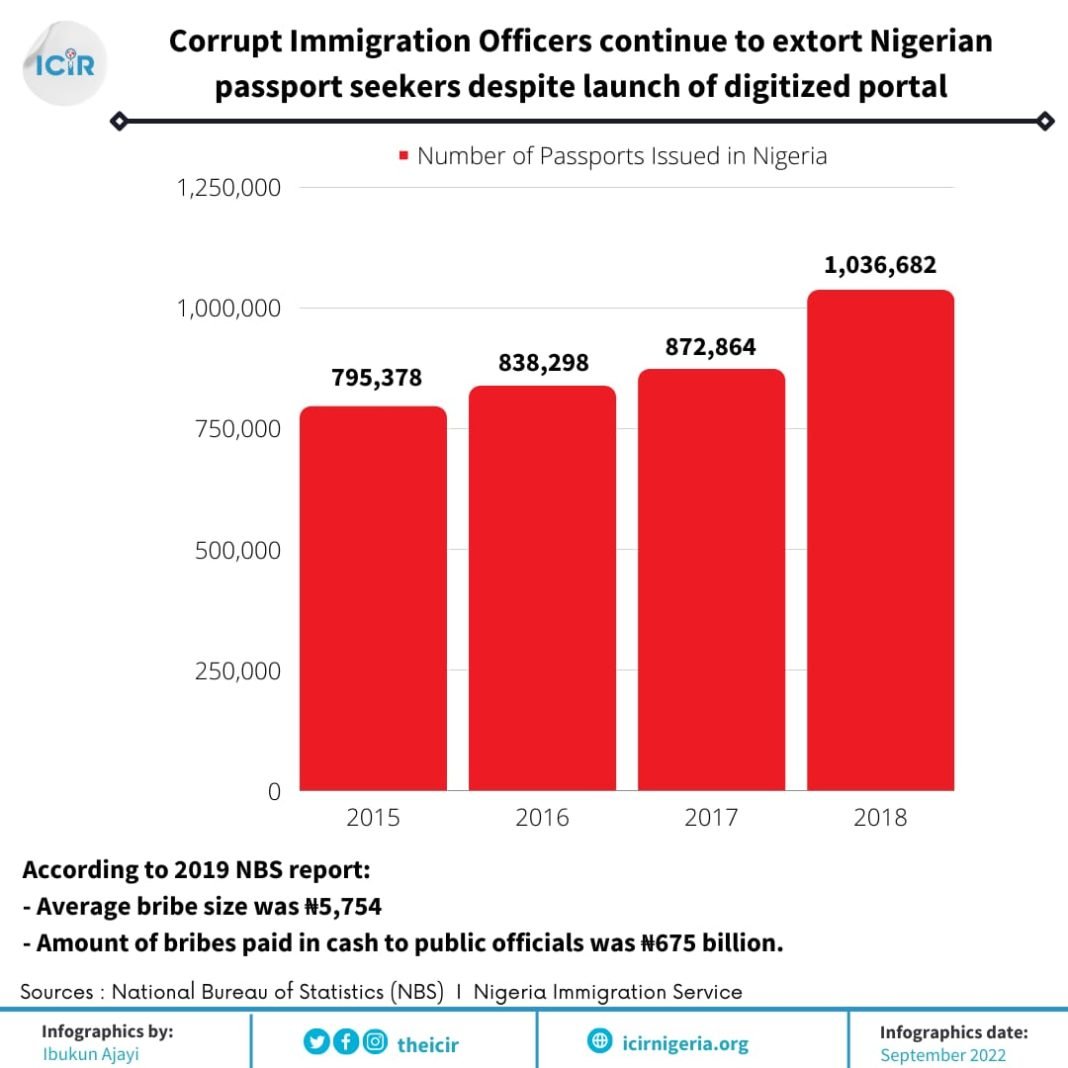
An infographic showing the number of passports produced by NIS between 2015-2018
The report revealed that direct bribery requests by public officials accounted for 60 per cent of all bribery transactions in Nigeria in 2019.
It further stated that “a large share of bribes paid in anticipation of a service to be rendered by a public official is an indication that bribes are often requested before action is taken to deliver a service.”
“Almost one in two bribes (45 per cent) are paid to speed up or finalise an administrative procedure. In a large share of cases, bribes are paid for purely speeding up a procedure (38 per cent),” the report stated.
Bribes paid to the officials of customs/immigration officers account for 31 per cent and 17 per cent of bribes collected by public officials in 2016 and 2019 respectively.
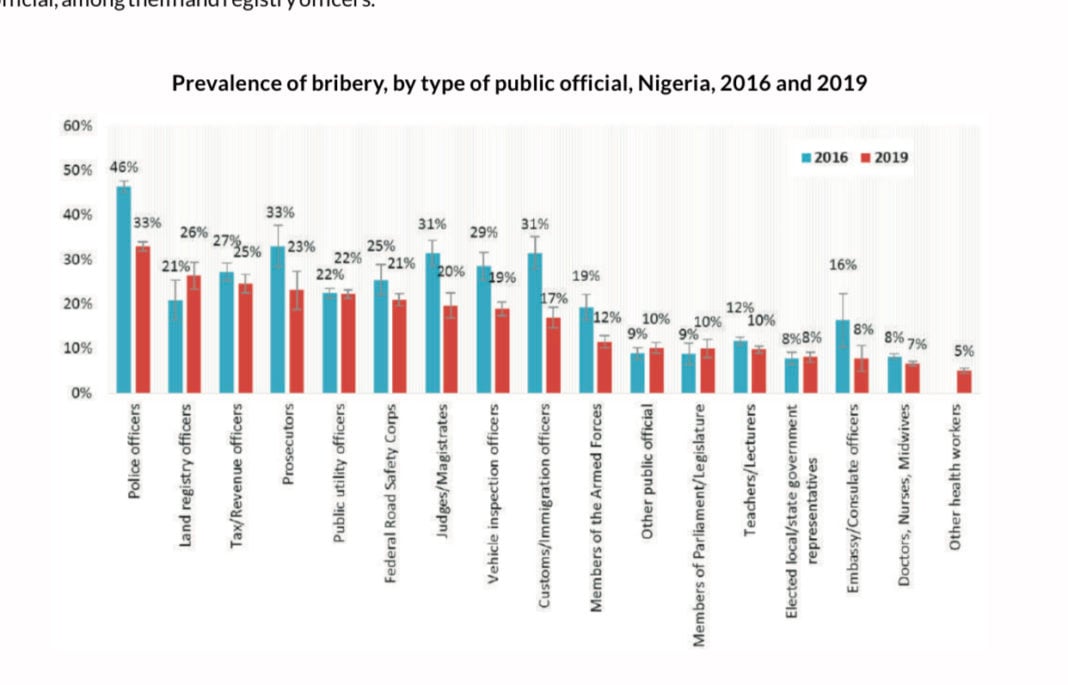
The report revealed that direct bribery requests by public officials accounted for 60 per cent of all bribery transactions in Nigeria in 2019.
It further stated that “a large share of bribes paid in anticipation of a service to be rendered by a public official is an indication that bribes are often requested before action is taken to deliver a service.”
“Almost one in two bribes (45 per cent) are paid to speed up or finalise an administrative procedure. In a large share of cases, bribes are paid for purely speeding up a procedure (38 per cent),” the report stated.
Bribes paid to the officials of customs/immigration officers account for 31 per cent and 17 per cent of bribes collected by public officials in 2016 and 2019 respectively.
The Corrupt Practices and Other Related Offences Act(2004) generally prohibits various perceived acts of corrupt practices arising from interactions or transactions involving public/government officers and the general public or private individuals.
The Act prohibits direct or indirect giving/offering and receipt of bribes or gratification to influence official acts related to official duties. The various instances under which bribes may be given or received are also treated under the Act.
The Act prohibits corruptly giving or receiving gratification for or on behalf of public officers for performance or nonperformance of official duties (sections 12, 13 and 14), giving and receiving of bribery through agents (section 20), bribery of a public officer with intent to influence decision making and other related official acts (section 21). Upon conviction, the person is liable to 7 years imprisonment(section 25)
Reacting to the development, a constitutional lawyer and human right activist, Festus Ogun argued that bribery, corruption and impunity persist at the Nigerian Passport Offices because the leaderships of the Nigerian Immigration Service are not truly committed to tackling the menace.

“It appears to me that the leadership of the NIS is not completely committed to putting an end to corruption and impunity in her passport offices in the country.
“I’m saying this because I know as a matter of fact that corruption is not tolerable under our extant laws in this country. From the criminal code to other relevant laws and statuses in the country, bribery and corruption are not tolerable. It’s not acceptable. It’s a crime and it’s gross misconduct, especially for public officials who took an oath, and not just that, civil servants are not expected to demand or take bribes in the delivery of their duty.
“I honestly feel that if the leadership of NIS are indeed committed to putting an end to the issues of corruption, bribery and impunity in their offices, they will put more stringent measures in place to forestall these kinds of menace.
“I honestly feel like the problem is battling the image of our country. It batters the image of the country. It continues to dampen public confidence in our system. It shows how weak the situation has become.
“I will continue to recommend that the leadership must show sincerity in ensuring transparency and accountability in our passport offices. Unless and until proper measures to forestall the gross bribery in the migration service, then this will continue,” Ogun noted.
While noting that the problem persists because high-rank officials also benefit from the corruption, Ogun maintained that beyond the dismissal of the officials found wanting, the NIS must ensure that officers caught are appropriately prosecuted.
“Interestingly, the leadership of the Nigerian Immigration Service cannot claim to be unaware of the massive corruption, massive bribery ongoing in the passport offices, but they are not showing true commitment and that is where the issue lies. They seem not to show true commitment to putting an end to the malpractices going on in the offices largely because a lot of the senior officials are equally profiting from it. They are equally profiting from the bribery and corruption in the system. I charge the security agencies to ensure that officers found wanting are not only dismissed but are also sanctioned.”
He advised the citizens to ensure they report accordingly to the appropriate authorities, and the press must ensure that they expose the corruption in the Nigerian Immigration Service.
In the same vein, a senior research analyst at the BudgiT Foundation, Vahyala Kwaga explained that the menace of corruption persists at the NIS because of a lack of accountability.
He noted that the inflated costs could make it hard for average Nigerians to afford a passport.
“The implication of this is that poor Nigerians would simply not be able to afford passports. The corruption in this process has created a form of ‘black market’ in which the price of obtaining one, can continue to climb (though not indefinitely) because there would always be Nigerians willing to ‘pay extra’ to have it done faster and with as little discomfort to them as possible.
“In addition, the lack of accountability in the process will erode citizens’ trust in the government, in terms of its legitimacy as an institution. Time and time again, the Nigerian government has failed to understand that trust and respect for government by citizens are indispensable to peace and stability. This trust emerges from an acceptance by the people that the government is able and willing to discharge its obligations without compromise or corruption.
“A final implication is that the government is being deprived of its earnings that should accrue to the federal treasury. For every transaction involving this fraud, there is money finding its way to private accounts instead of the government’s purse.”
He called on the leadership of the agency to ensure accountability in the system and that erring officers are punished.
“Blocking corruption requires another form of accountability that is often not seen enough – the public punishment of officers. The challenge with this is that government corruption often involves the highest officials of an agency (or at least their tacit approval). Heads of agencies that are found to be corrupt should be punished accordingly. If the heads of these agencies cannot be held accountable for the actions of their officers and refuse to punish their officers, it makes no sense that they should continue to be in authority. “On the reported scarcity of passport booklets in Nigerian passport offices, Kwaga said, the way to solve this is “to increase the number of booklets.”
“The government ought to utilise the data on how many people obtain passports per month, per quarter and year. They should use that information to plan accordingly. There have been moves in this direction as of March of this year by the acting Comptroller General of Immigration, Idris Isah Jere. The latter had made a case for the increase in the budget of the Nigerian Immigration Service to enable them to produce the booklets locally. However, it is uncertain whether the monies have been released and how well they have been utilised.
“Another recommendation is to simplify the process. It is commendable that the current Minister of the Interior has made efforts in the area of passport acquisition, but it is still difficult for many who are not internet savvy or technologically sophisticated. If the process can commence in a bank and end with a data capture (thereby making it easier), it would create fewer instances of corruption.”

NIS reacts
When contacted by The ICIR, Amos Okpu, the Nigerian Immigration Service spokesperson insisted that the NIS does not recognise any cash payment for passport processing, saying that the only mode of payment recognised by the agency is online payment.

However, when confronted with our findings regarding the barefaced extortion and bribery in Nigerian passport offices, he said he found it ‘strange’ and the agency is unaware of it.
“We don’t have cash payment on our system. All our payments are online. Nobody is coming to this place to make a cash payment,” he insisted.
“What you are saying is strange to me. Somebody coming here must have made his or her payment online. You only come here with your evidence of payment to process your passport. They only come here on the appointment date.
“Nobody is expected to come, saying he wants to pay cash to anybody. There is nothing like that. If you are asked to pay cash, we have SERVICOM office; we have public relations office, these are the offices for complaints regulation while they are there.”
Add a comment
